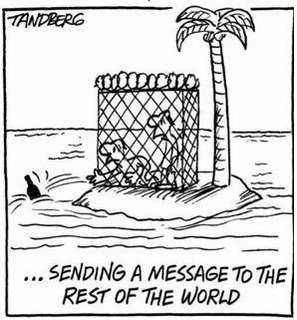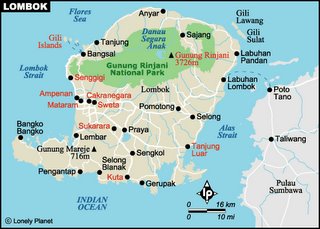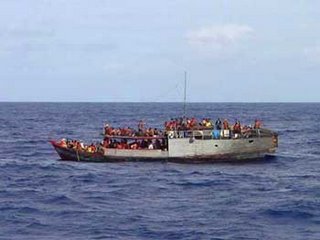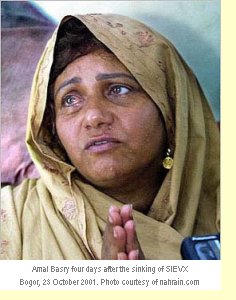 Hi,
Hi,
I've just got an email from Mohammad Sagar, one of the last 2 refugees remaining on Nauru. He asked me to put a link to the website that he and the other man - Mohammad Faisal - are maintaining. It is www.leftonnauru.com
There are photos, stories, journal-style thoughts, links etc. You can even drop them a line to give them a word of support. Please go and have a look. I will put the link in the toolbar on this page, as well. Meanwhile, I will paste below an article written by Michael Gordon in The Age this past week. It's long, and I'm sorry for that, but if you read it, you may begin to understand the deperation faced by these two poor guys who have already been assessed as genuine refugees by the UNHCR *and* DIMIA....
'Living hell' built for two
Michael Gordon - March 11, 2006
MUHAMMAD Faisal calls his life a living hell. He suffers from high anxiety and poor vision, takes medication three times a day, and recently, in an act of desperation, tried to take his life.
Faisal, 26, is one of the last two asylum seekers left on Nauru under the Howard Government's Pacific Solution. The other, Mohammad Sagar, 29, became concerned last month when he knocked on Faisal's door and there was no reply.
He called the security people and a nurse at the camp and, when they opened the door, he saw Faisal, semi-conscious, bleeding from cuts to his chest, arms and stomach. Faisal was taken to the clinic that once served several hundred mainly Afghan and Iraqi asylum seekers on the tiny, impoverished island.
He later said he had been "pushed to the edge" by the isolation and uncertainty of his situation and a sense of desperation.
"In Nauru life is black," he told the The Age this week. "I feel I am in hell. When I came to Nauru I was 21. My age now is 26. Everything is negative."
Now, almost 4½ years after being sent to Nauru, two of the world's loneliest asylum seekers are now preparing for a new existence outside the camp.
While the camp will be maintained, at a cost to Australian taxpayers of $1 million a month, those employed by the International Organisation for Migration (IOM) who have been responsible for the welfare of the two men, including a psychiatrist, are pulling out.
In the coming weeks, the two Iraqis will have to adapt to new "independent living" arrangements where they will have their own accommodation, complete with a television, DVD player, telephone and internet access.
There will also be an allowance to buy their own food and a pushbike, complete with helmet and padlock, for each to travel around the once phosphate-rich but now near-bankrupt 21-square-kilometre island, where power failures and water shortages are daily occurrences.
The shift is portrayed by the Immigration Department as an opportunity for the men to make their own choices. The men see it differently. "I feel that this step means that they want to keep me on Nauru forever," Faisal wrote in a recent letter to Neill Wright, the regional representative of the United Nations High Commissioner for Refugees.
Both men have been found to be refugees, with genuine fears of persecution if they returned to Iraq, but both were deemed to be a security threat to Australia after extensive interviews with ASIO last year.
The finding has left the two men, and parties such as the UNHCR who are trying to find another country willing to resettle them, in an invidious, almost impossible position. They have not been told the basis of the finding and there is no provision for an appeal or a review by an independent authority.
Not knowing the allegation against them is a constant worry. As Faisal puts it: "I am not doing anything wrong to other countries, or in my own country, or on Nauru. Why am I rejected? I am not dangerous to anyone."
When The Age became the first media organisation to be given unfettered access to the camp almost 12 months ago, both complained about the way the ASIO interviews had been conducted.
Back then, Sagar said he was struggling to cope with the anxiety. "I'm living in limbo. To think there is a possibility, even 1 per cent, to get a rejection, makes me feel very, very bad."
Both said then that they had been accused of being uncooperative in the interviews, but emphatically denied this. It was not until many months later that they were told of the ruling, around the same time that the other 25 asylum seekers still on Nauru were given visas to come to Australia.
Susan Metcalfe, a researcher who has visited the men twice on Nauru and has provided support to many of those who have since left the island to begin new lives in Australia, was distressed, but not surprised, that Faisal had resorted to self-harm.
Only days before the episode, she had written to Immigration Minister Amanda Vanstone voicing her concern about his mental condition.
"I am deeply concerned that he will not cope when the psychiatrist leaves this weekend," she told The Age yesterday. "The departure of the last Arabic-speaking staff member in January had a very negative impact on Faisal and contributed to his distress."
Ms Metcalfe also shares the men's concern that the new arrangements are a first step towards the Australian Government washing its hands of any responsibility for them, despite the commitment when Nauru agreed to set up the camps that "no persons will be left behind on Nauru". She finds the adverse security assessment hard to understand. "Both men are very human and not at all threatening. I don't believe that anyone has ever had a problem with them and I know that their friends in Australia find the ongoing situation incredibly distressing," she said.
"It is an absurd situation and a complete waste of all our time, energy and money. I doubt that Muhammad Faisal could have coherently answered questions in his ASIO interviews without psychological assistance, so I do have concerns about the basis for the decisions.
"I know that the lack of explanation for the decisions causes ongoing despair for both men. They can't even defend themselves because they don't know what they are being accused of."
Migration agent Marion Le, who met both men on Nauru, finds their situation "incomprehensible", suggesting there may have been a different outcome if the men had advocates present during their ASIO interviews.
Another who is surprised is Maarten Dormaar, a psychiatrist, who worked for the IOM at the camp until 2003. He says Sagar worked as a voluntary interpreter when required and performed the job well. "He was very respectful and unbiased as far as I could guess from the way the patients behaved during the interviews ," he said in an email to Ms Metcalfe.
Sagar has several concerns about the new arrangements, which were set out in a document prepared by the Immigration Department and presented to the two men. They include questions of health care, transport and security.
On transport, for instance, the document notes the IOM's commitment to provide "safe and dignified" transport for camp residents, with as little public exposure as possible. Under the new arrangements, this obligation would be met by the provision of pushbikes and helmets "for their exclusive use".
"I don't think it's a very wise idea, giving us bikes," Sagar told The Age. "Faisal is extremely short-sighted and taking medication three times a day. I don't think he would be able at all to ride a bike."
But their greater fear is that they have been forgotten. "We are afraid of that one day we would find ourselves abandoned on this tiny island and have to beg for the food," Sagar said in a letter to Mr Wright.
While Sagar has improved his English and computer skills on the island, Faisal is struggling. He says he thinks constantly of the friends who have left Nauru and is distressed that the department will no longer provide an interpreter.
In his letter to the UNHCR, Faisal said he was dying a slow death. "The only solution to my problem is that I get a country to live (like) a human being without being humiliated. My wish is to feel, even for once, that I'm alive."
(NB - cheers to Tandberg for the cartoon above)





